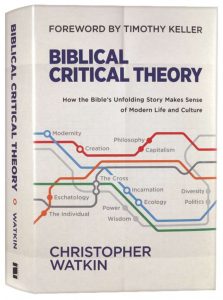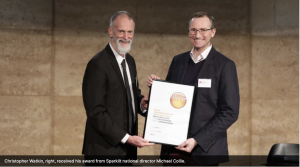
(original article by Anne Lim published on Eternity News)
Christopher Watkin’s 600-page book, Biblical Critical Theory: How the Bible’s Unfolding Story Makes Sense of Modern Life and Culture, was named the Sparklit Australian Christian Book of the Year at an awards ceremony in Melbourne on August 31st, 2023.
Watkin’s work – which uses the Bible to analyse and interpret contemporary Western culture – received ringing endorsements from the three judges and from theologians such as John Dickson, who called it a “magnificent achievement.”
Biblical Critical Theory was selected from a shortlist of ten nominees, each recognised for making a significant contribution to the church in Australia and beyond.

The judges – Greg Clarke, Meredith Lake and Catherine Place – said despite the daunting ambition of the book, “Watkin’s confidence, curiosity and joy are contagious. No matter where you happen to open the book, the author’s easy style, wide-ranging scholarship and generosity grab your attention and you are off, exploring the unfolding biblical narrative and how it cuts through assumptions and ideologies to speak to our times.
“An enlightening and absorbing read for anyone wanting to deepen their appreciation of how the Bible addresses our world here and now. To reframe debates and culture wars, you will regularly return to this resource.”
“We want to try and speak to the culture in which we live – and that’s also inside us – in ways that people can hear.” – Christopher Watkin
Watkin said he wrote the book to help people like himself – who want to make sense of how to live in the world as a Christian while pressing into the culture – to remain faithful to the Bible.
“I was in a position where a book like this would have helped me … as an undergraduate in a secular university, reading philosophy and literature, trying to make sense of it from a Christian point of view,” he said.
He discovered that Christian books either denounced the culture or affirmed its values, and neither of those approaches rang true for him. For him, the Bible set forth “a much grander, richer, more multidimensional view of how to live in the world.”
“I want to take the Bible seriously and believe God’s promises and not have to take a step back from that. But we want to try and speak to the culture in which we live – and that’s also inside us – in ways that people can hear.”
“When Chris steps onto the field of his main expertise, modern intellectual history, this book really shines.” – John Dickson
Author and historian John Dickson, appearing by videolink from Chicago, hailed the book for doing two very difficult things at the same time.
“First, Chris is providing a thoroughly reliable guide to the complex biblical material from Genesis to Revelation. The book offers a true biblical theology, tracing ideas about God and the world as they emerge from the text of Scripture itself – and for someone who’s not meant to be a biblical scholar, Chris is weirdly solid and insightful into everything that he touches on,” he said, prompting laughter in the audience.
“And then, when Chris steps onto the field of his main expertise, modern intellectual history, this book really shines.”
The second thing the book does, Dickson said, is to raise the philosophical and cultural questions of the best thinkers in the Western tradition and show what the Bible has to say in reply to all of their brilliant questions.
“The extraordinary thing is Chris doesn’t try to dazzle the reader with the fact that he really understands those impenetrable thinkers like Heidegger, Marx, Foucault and Derrida. Instead, what Chris does is he shows why these figures deserve their place among the great thinkers in the Western tradition – how their ideas continue to influence the contemporary conversation.
“And importantly, where those thinkers are wrong, they’re wrong usually because they’ve got a half-truth that the Bible itself completes and is the full representation of.”
Dickson concluded that what he loves about Watkin’s book is that it is not just Bible theology for the believer, nor is it philosophical apologetics for the sceptic. “It rightly lifts up the Bible itself as a public document. And he does this in the best tradition of St Augustine’s City of God, and all that. It is a magnificent achievement.”
Watkin said he would love it if “the sons and daughters of the King … found a deepened love for God’s word in this book.”
Receiving the award, Watkin said he would love it if “the sons and daughters of the King … found a deepened love for God’s word in this book.”
“And to that extent, you can dip into it at any chapter … If there’s a particular part of the Bible you love, read that chapter. Or if there’s a particular part of the Bible you think you don’t know as much about as you might, then dip into that chapter and just revel in the riches and the wisdom of all of God’s word.”